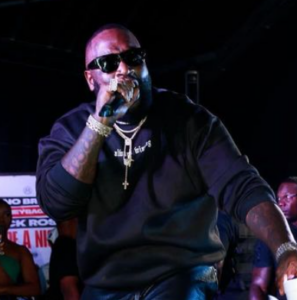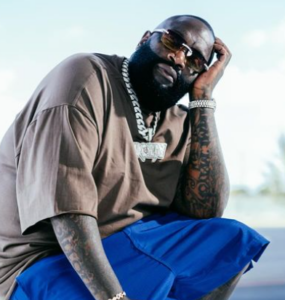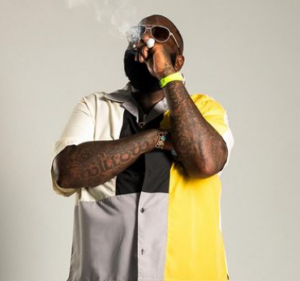With their public reconciliation, fans are now left wondering what the future holds for Rick Ross and Trick Trick
While it’s unclear what the next steps are, the fact that they were able to resolve their differences after so many years is a testament to the power of growth and dialogue.
Their reunion is a reminder that even in a genre as competitive as hip-hop, where egos often clash, reconciliation is possible.
By setting aside their differences, Ross and Trick Trick have not only healed a rift but have also shown the world that unity can be a powerful force for change.
The Summer Jamz 2014 incident between Rick Ross and Trick Trick is a significant moment in hip-hop history, highlighting the importance of respect, regional pride, and the complexities of the music industry.
While the exact details of the confrontation remain murky, the incident serves as a reminder of the tensions that can arise when artists cross into different territories without acknowledging the culture and artists that thrive there.
For Rick Ross, the event was an unfortunate disruption to his tour plans. For Trick Trick, it was a statement about the importance of supporting local artists.
Whether or not the two rappers ever collaborate, the incident will continue to be remembered as a pivotal moment that showcased the power of local movements in shaping the broader hip-hop landscape.

Also Read: Who Is Tallie Kissinger? Meet David Kissinger Wife, Kids, Bio And More
Table of Contents
Rick Ross and Trick Trick’s Feud Explained
The conflict between Rick Ross and Trick Trick can be traced back to 2014, when Trick Trick reportedly blocked Ross from performing at the Summer Jamz concert organized by Hot 107.5 in Detroit.1
The incident quickly gained attention in the hip-hop world, with Trick Trick asserting control over his home turf and claiming that Ross had not paid the necessary respects to Detroit’s local scene.
This form of territorial protection, often referred to as enforcing “No Fly Zone,” was Trick Trick’s way of defending his city from artists who sought to perform without first reaching out to the local artists and community.
The situation intensified when Ross was physically barred from entering the concert venue by a group of Trick Trick’s affiliates, leaving fans and organizers shocked.
While some saw Trick Trick’s actions as a move to assert respect for his city, others criticized it as an unnecessary escalation. For Ross, this was a major setback, affecting not just his relationship with Detroit but also his broader public image.
Such a beautiful day to be a Boss
— Yung Rénzél 👑 (@RickRoss) September 2, 2024
Trick Trick’s Influence on Detroit’s Hip-Hop Scene
On the other side, Trick Trick, born Christian Mathis, is a Detroit-based rapper and producer known for his role in shaping the city’s hip-hop scene.
He gained national attention with his 2005 album The People vs. Trick Trick, but his influence extends far beyond his music. Trick Trick is known as a protector of Detroit’s culture and local artists, often emphasizing the importance of respect and unity within the community.
His “No Fly Zone” policy was a reflection of his belief that major artists should collaborate with and contribute to the local scene rather than simply profiting from it. For Trick Trick, this was about more than music; it was about respect, loyalty, and protecting his city from being overlooked or exploited by outsiders.
The Infamous 2014 Summer Jamz Incident
The 2014 Summer Jamz incident was a turning point in the feud between the two rappers. Ross was scheduled to headline the event, but upon his arrival, he was met with a blockade organized by Trick Trick’s team.
The confrontation did not turn violent, but it was clear that Ross would not be allowed to perform. Reports from the time suggested that the move was a direct consequence of Ross not paying homage to Detroit’s local scene, something Trick Trick took seriously.
Ross’ inability to perform was a public embarrassment, and the incident fueled speculation and media coverage about the tensions between the two. Trick Trick’s stance resonated with some fans who felt that major artists needed to show more respect to local cultures, while others criticized the approach as divisive.
Regardless, the feud between Ross and Trick Trick became one of the most talked-about stories in hip-hop in 2014.

Rick Ross’ Response to the Feud
- Initially, Ross didn’t respond aggressively to Trick Trick’s actions. In fact, he seemed to take a diplomatic approach, acknowledging that there were misunderstandings but not engaging in a public war of words.2
- This restraint was likely strategic, as Ross had other business interests and projects at the time that he didn’t want overshadowed by a feud.
- However, the tension between the two lingered for years, with many wondering whether the two rappers would ever resolve their differences. The incident had left a mark on Ross’ relationship with Detroit, and despite his success elsewhere, his strained ties with the city persisted.
- While Trick Trick may not have achieved the same level of mainstream fame as Rick Ross, his impact on Detroit’s music scene is undeniable. His albums, such as The Villain and Outlaw, showcase his gritty style and commitment to representing Detroit’s street culture.
- In addition to his music, Trick Trick has also released several mixtapes throughout his career, helping to keep the underground scene alive.
- Trick Trick’s influence extends beyond music. He is known for his activism and efforts to uplift Detroit’s community.
- From organizing events to speaking out about social justice issues, Trick Trick has made it clear that his work goes beyond the studio. This dedication to his city is part of what has earned him respect, even as his feud with Ross was playing out.
The 2024 Reconciliation: A Long-Awaited Moment
Fast forward to September 2024, and Rick Ross and Trick Trick made headlines once again—but this time for a much more positive reason. The two artists came together at the Out Community First Action concert hosted by Michael ‘Harry-O’ Harris.
The event, held in Pontiac, marked a significant moment in their relationship as the two rappers appeared on stage together, symbolically ending their decade-long feud.
Ross performed his hit single “I’m Not A Star” from his 2010 album Teflon Don, but the performance was not the main highlight. What captured the audience’s attention was Ross’ acknowledgment of his history with Trick Trick and their mutual decision to move forward. Before launching into his performance, Ross addressed the crowd:
“You flying me out last night, you having Trick Trick bring me out on stage. I’m sure everybody knows me and Trick Trick had our differences for over a decade, and here we are just moving forward, doing big things in the community.”
The moment was powerful, as it symbolized not just the resolution of personal differences but also a commitment to using their platforms for the greater good.

The Symbolism of Their Reunion
The fact that Rick Ross and Trick Trick resolved their feud at a community-focused event adds another layer of meaning to their reconciliation. For years, their feud represented a broader issue in hip-hop—the tension between mainstream success and local respect.
By coming together at an event aimed at community upliftment, both artists sent a message that unity and collaboration are more important than long-standing grudges.
This reunion also reflected the maturity and growth of both artists. Over the years, they had evolved not only as musicians but also as individuals with responsibilities to their communities.
Their decision to bury the hatchet after a decade demonstrated that even the deepest conflicts could be resolved when there is a shared commitment to positive change.

Also Read: Ricardo Montaner: American Singer Religion, Ethnicity, Family, Career And More
Rick Ross vs Trick Trick: The Summer Jamz 2014 Incident
The altercation between Rick Ross and Trick Trick at the Summer Jamz 2014 concert in Detroit is one of the more notorious moments in hip-hop history.3
This incident, shrouded in mystery and speculation, has been discussed and debated by fans and media alike.
What exactly sparked the tension between the two rappers? While many details remain unclear, the incident serves as a reflection of deeper issues in the hip-hop community, particularly about regional pride and respect for local artists.
On June 21, 2014, Rick Ross was set to headline the Summer Jamz concert at the Chene Park Amphitheater in Detroit. The concert was anticipated to be a major event, with a massive crowd of fans gathering both inside and outside the venue.
However, tensions flared when Ross was allegedly blocked from entering the venue by a group led by Detroit rapper Trick Trick. This incident quickly escalated into a major issue, raising questions about what had caused such a standoff between two prominent figures in the hip-hop world.
Conflicting Reports from Authorities
Amidst the back-and-forth between Ross and Trick Trick’s camps, the Detroit Police Department weighed in on the matter. According to the police, they received no calls for assistance during the incident.
Moreover, the police denied the presence of any significant crowd outside the venue that would have been capable of blocking Rick Ross’s entry. This discrepancy between the police report and Ross’s account added another layer of confusion to the situation.
If there was no official report of a crowd preventing Ross from entering, it raises the question of whether this was a smaller, more private disagreement rather than the large-scale confrontation that it was initially portrayed as in the media.
The lack of concrete details and the conflicting accounts only served to fuel speculation and rumors about what really went down at the Summer Jamz concert.

Trick Trick’s YouTube Response
In the aftermath of the incident, Trick Trick chose not to give in to media pressure and declined to elaborate further on the altercation.
Instead, he posted a video on YouTube in which he addressed the situation in a vague but defiant manner. The video was filled with expletives, and in it, Trick Trick made it clear that he considered the dispute a private matter.
He stated:
“Concerning myself and that individual, it’s none of your motherfking business. That’s a grown man; I’m a grown man. Grown men don’t put grown men business out to the motherfking public!”
This response suggested that Trick Trick was uninterested in airing out his grievances in public and preferred to handle the situation privately.
His stance reflected a sense of pride and integrity, implying that whatever issues existed between him and Rick Ross were for them to resolve as adults, away from the prying eyes of the media and fans.
View this post on Instagram
The “No Fly Zone” Policy: A Deeper Look
At the core of the Rick Ross and Trick Trick dispute lies the “No Fly Zone” policy. This unwritten rule highlights the importance of respecting local artists and communities, particularly in a city like Detroit, which has a rich musical history but has often been overlooked by the mainstream music industry.
For Trick Trick and others who enforce the “No Fly Zone,” it’s about ensuring that artists from outside the city give back to the local scene rather than just profiting from it.
The policy may seem controversial to outsiders, but for those within Detroit’s music community, it’s viewed as a necessary measure to protect their culture and ensure that their voices are heard.
Many fans and artists from Detroit have expressed support for the idea, arguing that it forces major artists to acknowledge and uplift the local talent.




